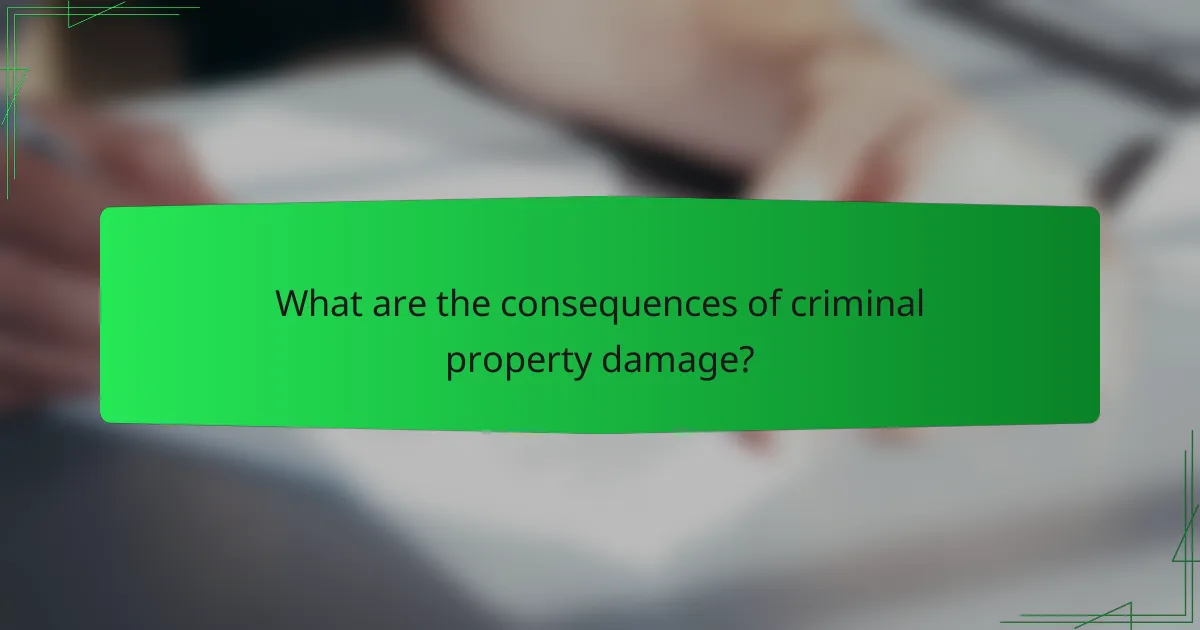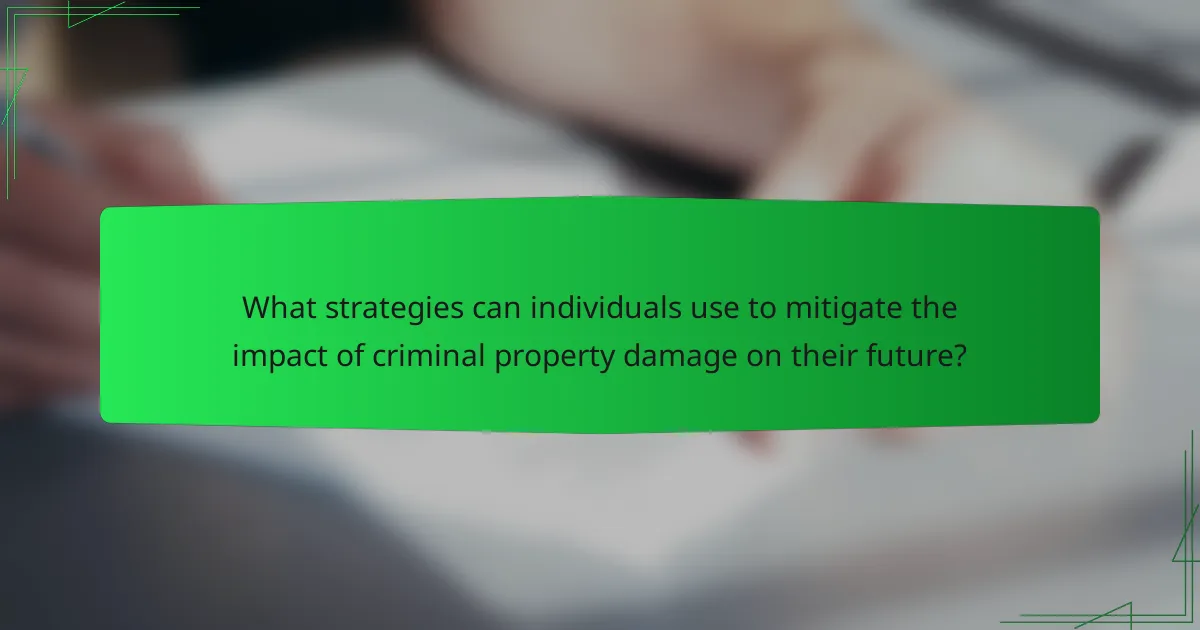Criminal property damage refers to the intentional destruction of someone else’s property, which can result in significant legal consequences, including fines, imprisonment, and restitution costs. A criminal record stemming from such offenses can severely impact future employment opportunities, as many employers conduct background checks that may disqualify candidates with a history of criminal activity. The article explores how a criminal record affects job prospects, particularly in trust-sensitive fields, and highlights the barriers individuals face in the job market. It also discusses proactive measures individuals can take to mitigate the impact of their criminal record, such as seeking legal advice, engaging in community service, and pursuing education or vocational training to enhance employability.

What are the consequences of criminal property damage?
Criminal property damage can lead to legal penalties, including fines and imprisonment. Individuals found guilty may face restitution costs to repair or replace the damaged property. A criminal record is a significant consequence, affecting future employment opportunities. Employers often conduct background checks, which can reveal such offenses. This record may limit job prospects in fields requiring trust or responsibility. Additionally, the stigma associated with a criminal record can impact personal relationships and community standing. The severity of consequences often depends on the extent of the damage and prior criminal history.
How does criminal property damage impact an individual’s criminal record?
Criminal property damage results in a permanent mark on an individual’s criminal record. When a person is convicted of property damage, it typically leads to a felony or misdemeanor charge. This classification depends on the severity and value of the damage caused. A criminal record can affect various aspects of life, including employment opportunities and housing applications. Employers often conduct background checks that reveal such convictions. Many organizations view criminal records negatively, leading to potential job rejections. Additionally, a criminal record may limit access to certain professional licenses. Ultimately, the impact of criminal property damage on an individual’s record can have long-lasting consequences.
What types of records are created from criminal property damage incidents?
Criminal property damage incidents create several types of records. These include police reports documenting the incident details. Incident reports typically outline the nature of the damage and any suspects identified. Arrest records are generated if individuals are apprehended in connection with the damage. Court records may be created if charges are filed against an individual. Additionally, insurance claims records can be established when victims seek compensation for damages. These records serve as official documentation for law enforcement and legal proceedings.
How long do these records typically last?
Criminal records for property damage typically last for seven years. In some jurisdictions, they can remain on a person’s record indefinitely. The duration can vary based on the severity of the crime and local laws. For example, felony convictions may have longer retention periods than misdemeanors. Additionally, some states offer expungement options after a certain period. This means that after meeting specific criteria, individuals can have their records cleared. Understanding the local regulations is essential for accurate information on record retention.
What are the legal implications of being convicted for property damage?
Being convicted for property damage can result in criminal penalties, including fines and imprisonment. The severity of the penalties often depends on the extent of the damage and jurisdictional laws. Convictions typically lead to a criminal record, which can impact future employment opportunities. Employers may conduct background checks that reveal such convictions. Some states allow for expungement under specific conditions, but this varies by location. Additionally, restitution may be ordered to compensate the property owner. Repeat offenses can lead to harsher penalties, including felony charges in severe cases. Legal representation is crucial for navigating the implications effectively.
What penalties do individuals face for criminal property damage?
Individuals face various penalties for criminal property damage. Penalties can include fines, restitution, and imprisonment. The severity of the penalty often depends on the extent of the damage. For minor damage, individuals may receive a misdemeanor charge. This can result in fines up to $1,000 or up to one year in jail. For significant damage, felony charges may apply. Felony convictions can lead to fines exceeding $10,000 and imprisonment for multiple years. Additionally, a criminal record may impact future employment opportunities. Employers often conduct background checks and may view property damage convictions unfavorably.
How do different jurisdictions handle property damage offenses?
Different jurisdictions handle property damage offenses through varying laws and penalties. In some areas, property damage is classified as a misdemeanor, resulting in fines or short jail sentences. Other jurisdictions may categorize severe cases as felonies, leading to longer imprisonment and higher fines. For example, California treats vandalism causing damage over $400 as a felony, while smaller damages may incur misdemeanor charges. In contrast, Texas generally classifies property damage as a misdemeanor unless it exceeds a specific monetary threshold. Additionally, some jurisdictions offer diversion programs for first-time offenders, allowing them to avoid a criminal record upon successful completion. Overall, the handling of property damage offenses is influenced by local laws, the extent of damage, and the offender’s history.

How does a criminal record affect future employment opportunities?
A criminal record negatively impacts future employment opportunities. Employers often conduct background checks during the hiring process. Many companies may disqualify candidates with a criminal history. This is particularly true for positions requiring trust, such as finance or childcare. Studies show that individuals with criminal records face higher unemployment rates. For instance, a 2018 study by the National Employment Law Project found that individuals with felony records are 50% less likely to receive callbacks for job interviews. Furthermore, some states have laws allowing employers to consider criminal records for specific time frames. These factors contribute to significant barriers in the job market for those with a criminal record.
What challenges do individuals with a criminal record face in the job market?
Individuals with a criminal record face significant challenges in the job market. Employers often have concerns about trust and reliability. Many companies conduct background checks, which reveal criminal histories. This can lead to automatic disqualification from job opportunities. The stigma associated with a criminal record can also affect hiring decisions. Research indicates that individuals with criminal records are less likely to receive callbacks for interviews. According to a study by the National Employment Law Project, people with records are often viewed as less desirable candidates. These barriers can result in higher unemployment rates among this population.
How do employers view criminal records during the hiring process?
Employers often view criminal records as a significant factor during the hiring process. Many employers conduct background checks to assess a candidate’s criminal history. This practice helps them evaluate the potential risks associated with hiring an individual. Research indicates that approximately 70 million Americans have a criminal record. This statistic highlights the prevalence of criminal histories in the job market. Employers may consider the nature of the offense, its relevance to the job, and how long ago it occurred. Some jurisdictions have laws regulating how employers can use criminal records in hiring decisions. Overall, the impact of a criminal record on employment opportunities can vary widely based on industry and specific employer policies.
What industries are more likely to hire individuals with a criminal record?
Industries that are more likely to hire individuals with a criminal record include construction, manufacturing, and food service. These sectors often have a high demand for labor and may prioritize skills over background checks. Many employers in these industries understand the challenges faced by individuals with criminal records. They may be more willing to offer second chances. For instance, the construction industry frequently hires workers regardless of their criminal history due to labor shortages. According to a report by the Society for Human Resource Management, many employers in manufacturing also express a willingness to hire individuals with past convictions. Food service establishments often focus on the immediate need for staff, making them more open to hiring those with criminal records.
What legal protections exist for job applicants with a criminal record?
Job applicants with a criminal record are protected by various laws. The Equal Employment Opportunity Commission (EEOC) enforces federal laws prohibiting employment discrimination. This includes discrimination based on criminal history in certain contexts. The Fair Credit Reporting Act (FCRA) regulates how employers can use background checks. It requires employers to obtain consent before conducting a background check. Additionally, some states have “Ban the Box” laws. These laws prevent employers from asking about criminal history on initial job applications. They aim to give applicants a fair chance without bias from their past. In many cases, individuals can also have their records expunged or sealed. This process can further enhance their employment opportunities.
How do “Ban the Box” laws affect employment opportunities?
“Ban the Box” laws improve employment opportunities for individuals with criminal records. These laws prohibit employers from asking about criminal history on initial job applications. As a result, applicants are evaluated based on their skills and qualifications first. Studies show that these laws can lead to increased hiring rates for formerly incarcerated individuals. For instance, a study by the National Employment Law Project found that “Ban the Box” laws led to a 15% increase in job offers for applicants with criminal records. This shift helps reduce stigma and allows for fairer assessments of potential employees.
What resources are available to assist individuals with criminal records in finding employment?
Resources available to assist individuals with criminal records in finding employment include job training programs, legal aid services, and nonprofit organizations focused on reentry. Job training programs provide skills development and vocational training tailored for those with criminal histories. Legal aid services offer assistance with expungement processes, which can help clear certain criminal records. Nonprofit organizations, such as the Safer Foundation and the Center for Employment Opportunities, specifically support reintegration into the workforce. These resources have proven effective in reducing recidivism and improving employment outcomes for individuals with criminal records. Studies show that access to these resources significantly increases the likelihood of securing stable employment.

What strategies can individuals use to mitigate the impact of criminal property damage on their future?
Individuals can mitigate the impact of criminal property damage on their future by taking proactive steps. First, they should seek legal advice to understand their rights and options. Engaging in community service can demonstrate accountability and willingness to amend past actions. Building a strong support network helps individuals navigate challenges and find new opportunities.
Additionally, attending counseling or rehabilitation programs can address underlying issues contributing to the behavior. Maintaining a clean record after the incident is crucial for future employment prospects. Individuals should also consider expungement options, which can remove the criminal record from public view.
Finally, developing new skills through education or vocational training can enhance employability and open new career paths. These strategies collectively contribute to a more positive future and help rebuild trust with employers and the community.
How can individuals expunge or seal their criminal records?
Individuals can expunge or seal their criminal records by following specific legal procedures. First, they must determine their eligibility based on local laws. Many jurisdictions require a waiting period after completing a sentence before applying. Next, individuals typically need to file a petition with the court. This petition should include supporting documents and reasons for the request. After filing, a hearing may be scheduled where individuals can present their case. If granted, the court will issue an order to expunge or seal the record. This process can vary significantly by state or country, so consulting an attorney is often advisable.
What steps are involved in the expungement process?
The expungement process involves several key steps. First, an individual must determine eligibility for expungement based on local laws. Next, they should gather necessary documentation, including court records and personal identification. After that, the individual files a petition for expungement with the appropriate court. Following this, a hearing may be scheduled where the individual presents their case. The court then makes a decision on the petition, which may result in granting or denying the expungement. If granted, the individual must ensure that the expungement is processed and reflected in public records. Finally, it’s advisable for the individual to obtain confirmation of expungement for future reference. These steps are essential for successfully clearing a criminal record.
Which factors influence the success of record sealing applications?
The success of record sealing applications is influenced by several key factors. These factors include the nature of the offense, completion of the sentence, and time elapsed since the offense. Specific offenses may be ineligible for sealing based on jurisdictional laws. Successful completion of parole, probation, or rehabilitation programs is often required. Additionally, a waiting period is typically mandated before applying for sealing. The applicant’s criminal history and behavior since the offense can also impact the decision. Courts may consider the applicant’s community ties and employment status. Finally, legal representation can significantly affect the outcome of the application process.
What skills or qualifications can help improve employability after a criminal record?
Vocational skills can significantly improve employability after a criminal record. Skills such as plumbing, electrical work, and carpentry are in high demand. Certifications in these trades can enhance job prospects. Soft skills like communication, teamwork, and problem-solving are also valuable. Many employers prioritize these attributes over criminal history. Educational qualifications, such as a GED or vocational training, can further boost employability. Programs specifically designed for individuals with criminal records often provide relevant training. These initiatives have shown success in reducing recidivism and improving job placement rates.
How can individuals enhance their resumes despite a criminal history?
Individuals can enhance their resumes despite a criminal history by focusing on skills and experiences. Highlighting relevant skills can demonstrate value to potential employers. Listing certifications and training can provide evidence of qualifications. Volunteering can showcase commitment and a positive work ethic. Tailoring the resume to specific job descriptions can align skills with employer needs. Using a functional resume format can emphasize abilities over work history. Networking can lead to opportunities and referrals that may overlook criminal history. Finally, being honest about the past while focusing on growth can build trust with employers.
What role do rehabilitation programs play in improving job prospects?
Rehabilitation programs significantly enhance job prospects for individuals with criminal records. These programs provide essential skills training and education. Participants often gain certifications that improve employability. Additionally, rehabilitation fosters personal development and accountability. This transformation can alleviate employer concerns about past behavior. Studies indicate that individuals who complete rehabilitation are more likely to secure stable employment. For instance, a report from the National Institute of Justice found that successful rehabilitation reduces recidivism rates, which positively influences hiring decisions. Overall, rehabilitation programs play a crucial role in bridging the gap between criminal history and employment opportunities.
The main entity of this article is criminal property damage, which encompasses the legal consequences and implications for individuals involved in such offenses. The article outlines the penalties associated with criminal property damage, including fines, restitution, and the potential for imprisonment, while also emphasizing the long-term effects on an individual’s criminal record and future employment opportunities. It discusses how a criminal record can hinder job prospects, the types of records generated from property damage incidents, and the varying legal implications across jurisdictions. Additionally, the article highlights strategies for mitigating these impacts, such as expungement, vocational training, and rehabilitation programs, which can significantly improve employability for those with a criminal history.